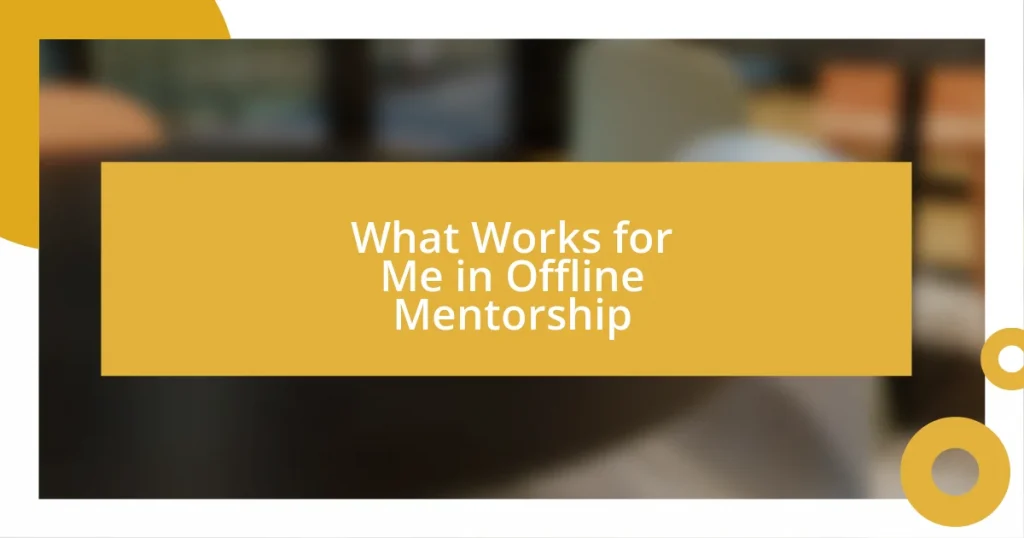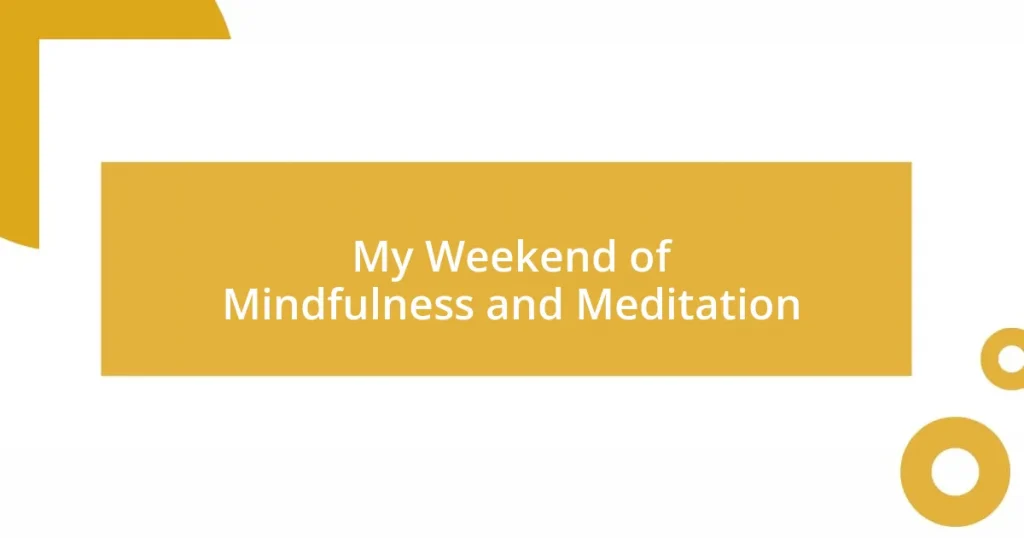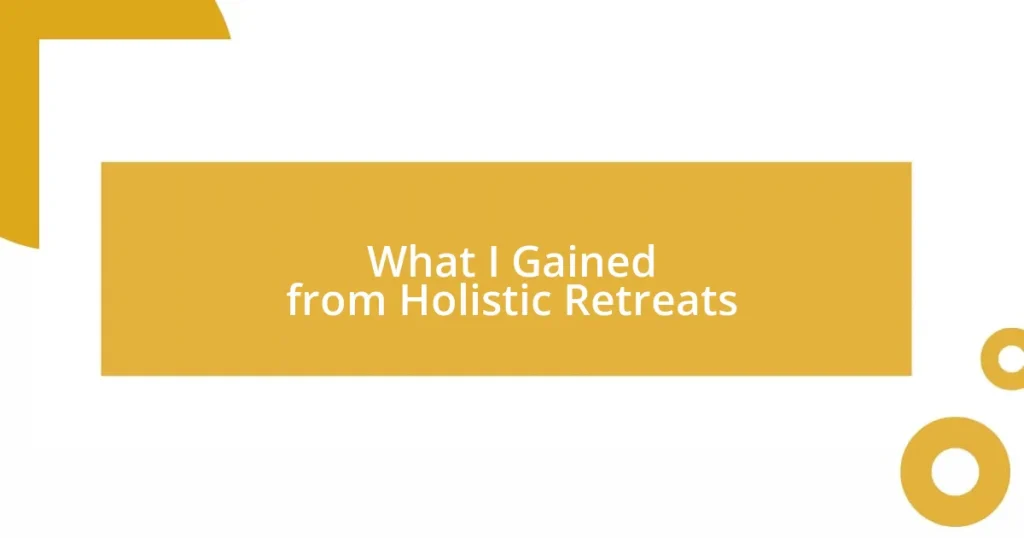Key takeaways:
- Offline mentorship fosters genuine relationships through personal connections and effective non-verbal communication, enriching the learning experience.
- Finding the right mentor involves identifying shared interests, emotional compatibility, and passion, which enhances the mentorship dynamic.
- Setting clear goals, tracking progress, and maintaining open communication are essential for a successful and sustained mentorship relationship.
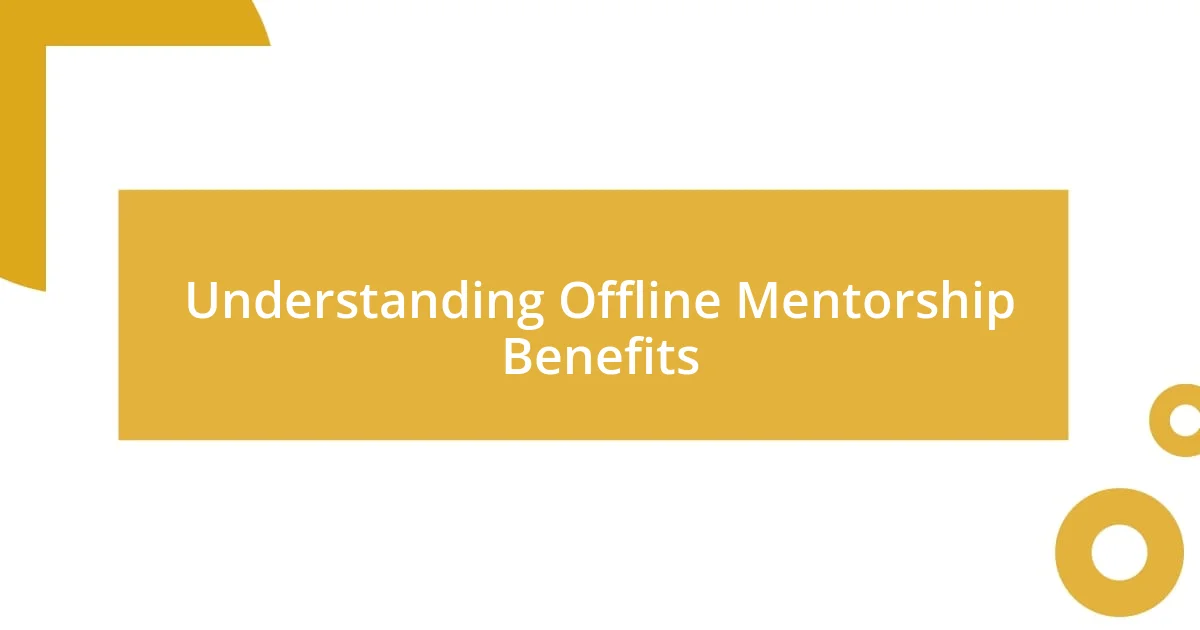
Understanding Offline Mentorship Benefits
Mentorship isn’t just about the exchange of knowledge; it’s a deeply personal experience that shapes our professional journey. I remember attending a local meet-up where I connected with a mentor who shared not only his expertise but also his stories of struggle and success. These moments of vulnerability made our discussions more meaningful, forging a bond that felt like a safe space for growth. Have you ever experienced a mentor who opened up in a way that changed your perspective?
One of the key benefits of offline mentorship is the opportunity to build genuine relationships. I once had a mentor who would meet me for coffee every few weeks, and those casual sessions often turned into brainstorming marathons filled with laughter and inspiration. The relaxed environment allowed creativity to flow naturally, making complex challenges feel more manageable. Can you recall a time when a simple conversation led to a breakthrough idea for you?
The instant feedback and non-verbal cues in an offline setting add a layer of connection that virtual interactions often miss. I find that being able to see a mentor’s expressions or gestures during a discussion offers insights that words alone can’t convey. This immediate responsiveness often spurs deeper conversations that help in grasping complex concepts more thoroughly. What benefits have you noticed from face-to-face interactions that you haven’t seen in online settings?
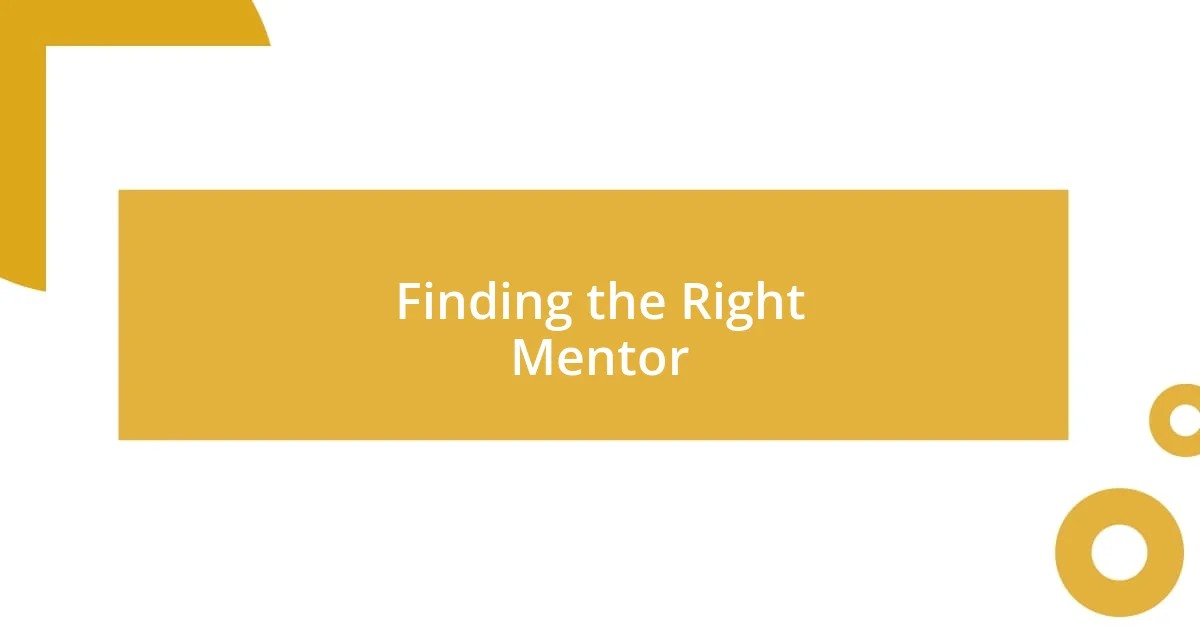
Finding the Right Mentor
Finding the right mentor can feel like searching for a needle in a haystack, but it’s so worth it when you connect with someone who resonates with your goals. For me, that connection came unexpectedly during a workshop where I spotted a mentor in action. She was not only knowledgeable but displayed genuine passion for her field. That energy was infectious and drew me in; I knew instantly that I wanted her guidance.
I often suggest looking for mentors who share similar interests or experiences. When I started to narrow down my search, I reached out to a few industry professionals whose work I admired. One former colleague responded enthusiastically, and as we talked, I realized that our similar backgrounds fostered understanding and trust. It was in those relatable experiences that I found a great mentor who could offer tailored advice for my journey.
Another important consideration is emotional compatibility. I recall an initial meeting with a potential mentor that was rich in insights but felt somewhat stiff. While he certainly had the expertise, the lack of warmth made it hard to open up. I learned that a mentor should make you feel comfortable and inspired. So, as you search for your mentor, don’t underestimate the significance of that emotional connection; it can make all the difference in the world.
| Key Factor | Description |
|---|---|
| Energy and Passion | The mentor’s enthusiasm for their field can make your learning experience engaging and inspiring. |
| Shared Experiences | Common backgrounds can foster trust and understanding, paving the way for effective guidance. |
| Emotional Compatibility | Feeling comfortable and inspired by your mentor is crucial for open and productive discussions. |
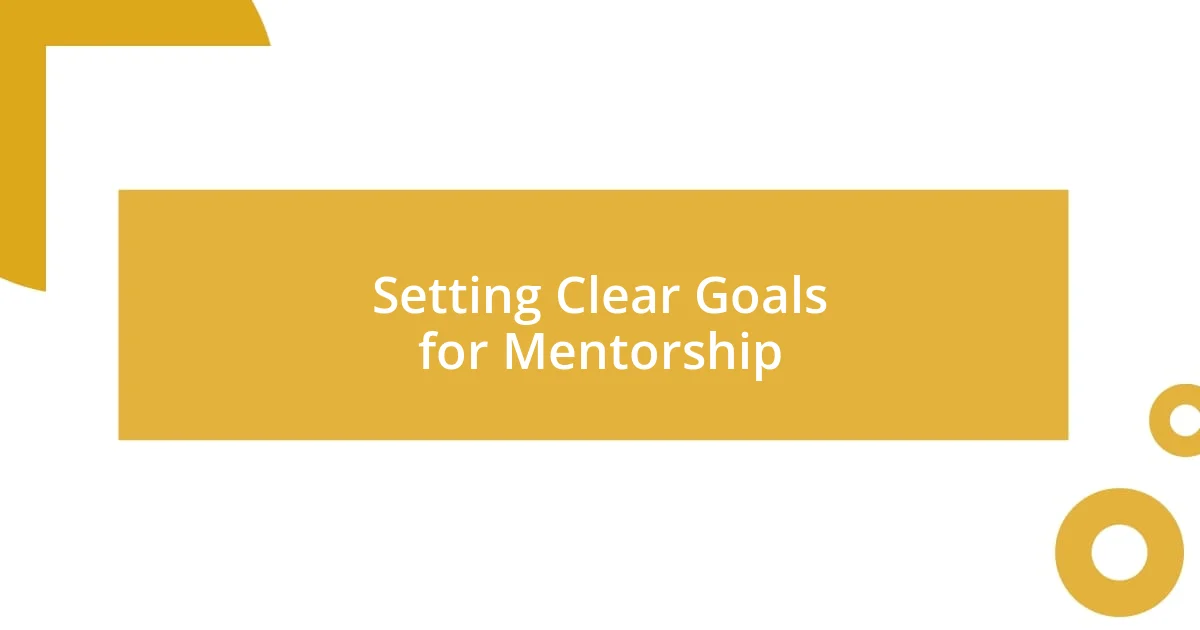
Setting Clear Goals for Mentorship
Setting clear goals for mentorship is an essential step in maximizing the experience. When I began my mentorship journey, I found that defining my objectives not only provided direction but also made our discussions more focused. I vividly recall sitting down with my mentor and outlining what I wanted to achieve, from developing specific skills to enhancing my professional network. It felt empowering to have a shared vision that kept us aligned, making every meeting feel purposeful.
To effectively set goals for mentorship, consider the following:
- Identify Priorities: Recognize what areas of your career or personal development you wish to focus on.
- Make Them Measurable: Establish quantifiable targets to evaluate progress; for instance, aiming to complete a project by a certain date.
- Keep It Flexible: Be open to revising goals as your mentorship evolves and new opportunities arise.
I remember realizing that periodic check-ins on these goals helped me assess not just my progress but also my mentor’s guidance. It created a dynamic dialogue where we could celebrate achievements and recalibrate if necessary. Setting clear goals transformed our relationship from mere advice-seeking to a collaborative effort, enhancing my growth experience significantly.
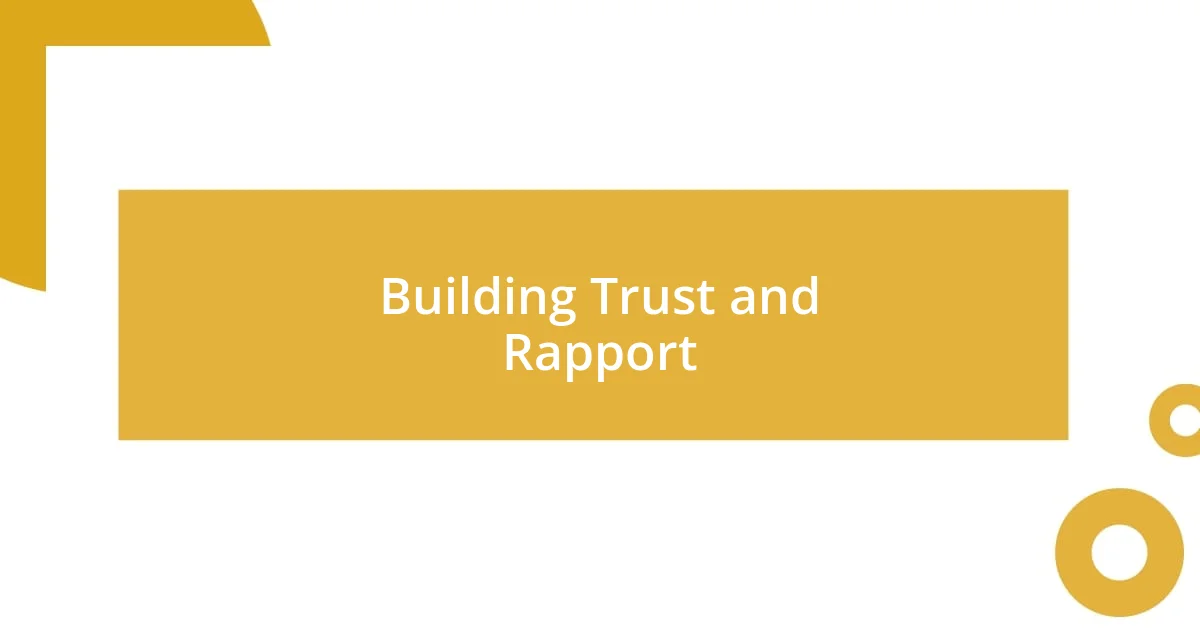
Building Trust and Rapport
Building trust and rapport in a mentorship relationship is vital for fostering meaningful communication. I remember my first coffee meeting with my mentor, where we spent the first few minutes discussing not just work, but our personal lives and interests. That simple shift made all the difference. It turned a formal encounter into a genuine conversation, allowing us to connect on a deeper level. Have you ever noticed how personal stories can break down barriers?
Another way to build this trust is through consistency. I found that regular check-ins not only keep you accountable but also solidify your relationship. I made it a point to follow up after our meetings with a quick message expressing gratitude for her insights. This small gesture showed that I valued her guidance, and over time, it strengthened our bond. When you genuinely appreciate your mentor’s efforts, it tends to create an environment where both of you can be open and honest.
Sharing vulnerabilities is perhaps the most powerful way to deepen trust. During one of our sessions, I opened up about my fears of failure, and to my surprise, my mentor shared her own struggles. That moment was transformational; it felt like we were on the same team, navigating challenges together. Have you ever wondered how much stronger connections can become through shared vulnerability? I’ve learned that being open not only humanizes the relationship but also invites support and encouragement, which is crucial for growth.
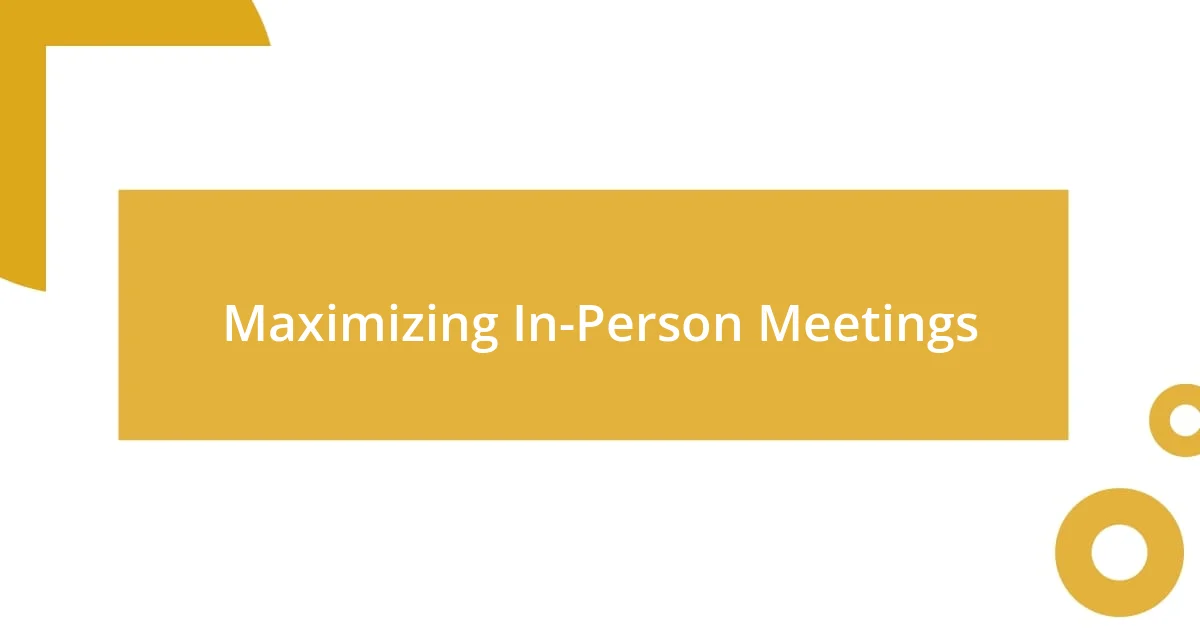
Maximizing In-Person Meetings
Maximizing the effectiveness of in-person meetings requires intentionality and a clear focus. I once approached a meeting with a list of topics I wanted to cover, but I quickly realized that a rigid agenda can stifle genuine conversation. Instead, I found it beneficial to prioritize one or two main topics and allow the rest of the meeting to emerge organically. This flexibility often led to the most valuable discussions—those unexpected insights that arise when you’re not afraid to explore tangents.
Timing also plays a crucial role in how much you can extract from these face-to-face interactions. From my experience, scheduling meetings at times when neither of you is rushed allows for a more relaxed atmosphere. I remember one particularly fruitful session where we met just before lunch. The laid-back vibe and rumbling stomachs created a sense of camaraderie, making it easier to dive deep into challenging topics. Have you ever noticed how a change in setting or timing can spark more meaningful dialogue?
Finally, I’ve discovered that following up after meetings can amplify their impact. After one enlightening discussion about career advancement strategies, I sent my mentor a brief email summarizing key takeaways and expressing appreciation. It wasn’t just about thankfulness; I reinforced my commitment to implementing her advice. This simple practice not only demonstrates respect for their time but also keeps the momentum alive, fostering a sense of accountability and collaboration.
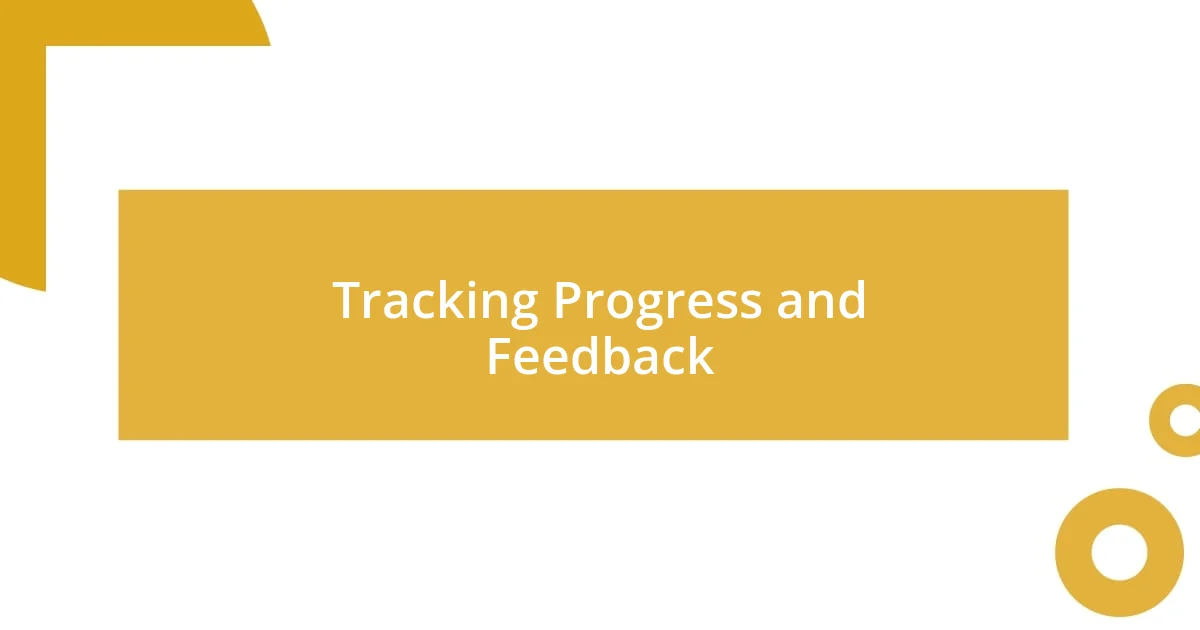
Tracking Progress and Feedback
Tracking progress in a mentorship takes some effort, but it’s well worth it. I remember after a few months with my mentor, we decided to set measurable goals. Each session, I would bring a brief update on where I stood with those goals. It was so empowering to see tangible progress; those small wins kept me motivated and excited about our journey together. Don’t you think reflecting on progress can ignite a spark of inspiration?
Feedback is a crucial piece of the puzzle. I once approached my mentor with a project I had poured my heart into, eager for her thoughts. Her candid feedback, both constructive and positive, gave me insights I hadn’t considered. I appreciated how she tailored her advice to my situation—it felt like she knew what would resonate with me. How have you handled feedback in your own mentorship experiences? I’ve learned that embracing it with an open heart can lead to breakthroughs.
To keep the dialogue flowing, I found it helpful to create a feedback loop. After our discussions, I would jot down her insights and my thoughts on how to implement them. Sharing this with her in our next meeting demonstrated that I valued her input—it became a mini celebration of our collaborative growth. Isn’t it amazing how such interactions can deepen the learning experience?
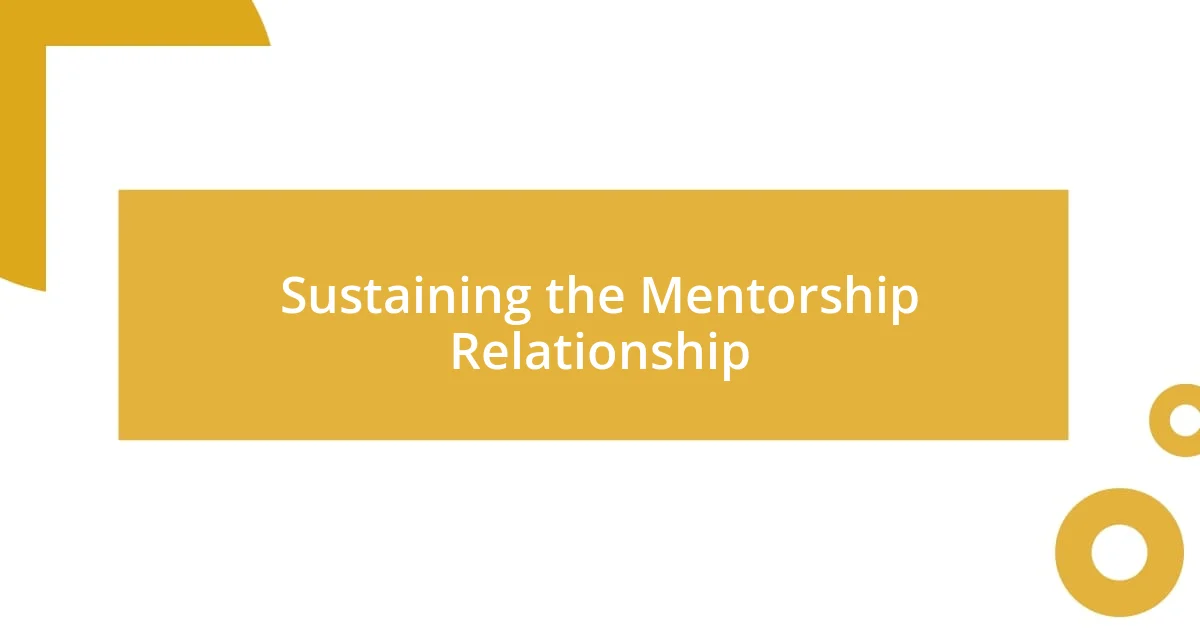
Sustaining the Mentorship Relationship
Maintaining a strong mentorship relationship requires a consistent effort from both parties. I recall a time when my mentor and I agreed to check in regularly, even if it was just a quick coffee catch-up. Those informal moments often turned out to be immensely valuable because they provided a low-pressure environment to discuss thoughts and ideas that might not surface in more structured meetings. Have you ever found that casual chats can lead to breakthrough moments?
Another key aspect is open communication. I’ve learned that expressing my needs and concerns can strengthen our connection. There was an instance when I shared my struggles with a new skill I was trying to develop. My mentor appreciated my honesty, which led to a deeper conversation about her own challenges. This transparency fostered a sense of trust, making the mentorship feel more like a partnership. Wouldn’t you agree that vulnerability can unlock richer exchanges in a mentor-mentee dynamic?
Lastly, celebrating milestones together adds a layer of intimacy to the relationship. I vividly remember when I landed a significant opportunity after months of hard work guided by my mentor’s advice. We celebrated the achievement with a nice dinner, where we not only acknowledged my success but also reflected on the journey we had taken together. Those shared moments create lasting memories and remind both of us of the value of our collaboration. How do you like to celebrate your achievements in mentorship? Celebrating together can reinforce that bond, making the relationship feel even more rewarding.










